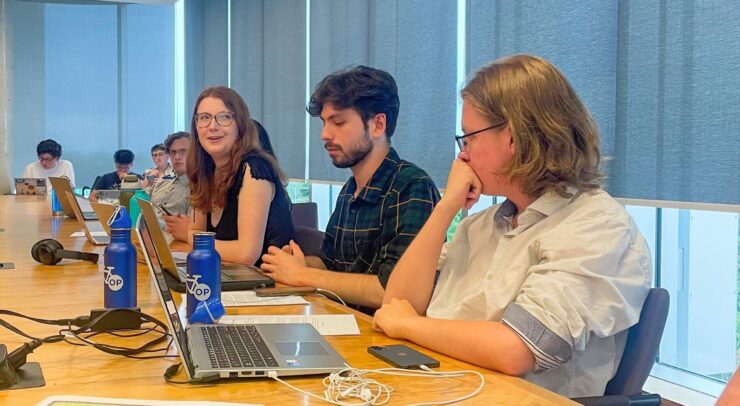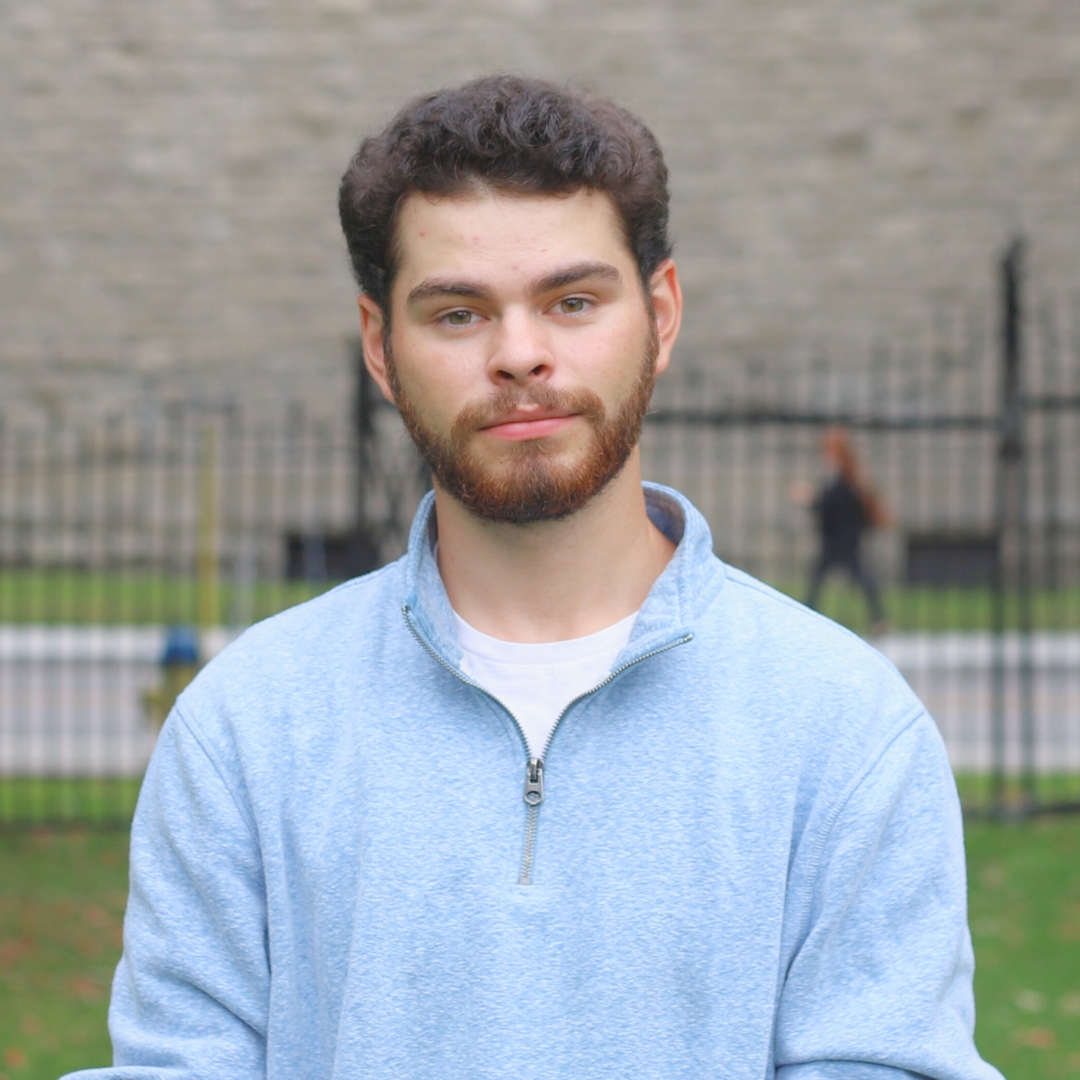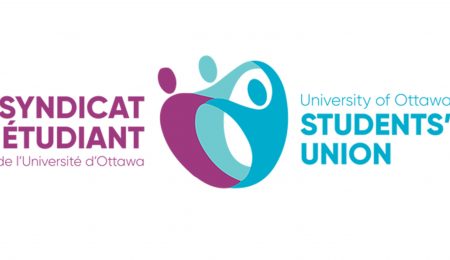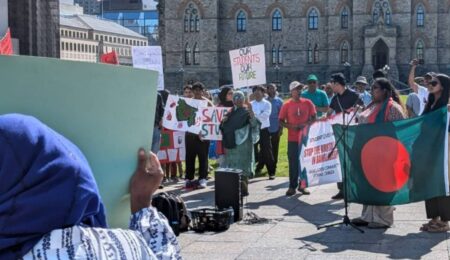The budget passed with 11 board members in favour, one abstention, and one against
At the University of Ottawa Students Union (UOSU) Board of Directors (BOD) budget meeting the evening of June 26, the BOD voted to pass their 2024-2025 budget. Faced with an 11.37 per cent reduction in the maximum membership fee of the UOSU after a referendum in October of 2023, the board ultimately voted in favour of the budget, and will close four services described as “underutilized, underappreciated, and unable to deliver as much value for students as other services or possible alternative programs.”
The services which will be closed are Foot Patrol, the Multifaith Centre, the Peer Help Centre, and the Bilingualism Centre — the last of which was the subject of the most debate during the meeting.
A letter from the Francophone community at the U of O was circulated prior to the meeting, published by La Rotonde. The letter called the proposed closure of the Bilingualism Centre “unacceptable”.
The letter finished “having our language, our rights and our services, debated every year, at every General Assembly, at every meeting, is exhausting. So we propose this: If bilingualism is so “expensive”, maybe you’re right and we should remove one language. We vote for English.” The letter was signed by 12 Francophone student leaders at the university, including UOSU Francophone affairs commissioner Daphnée Veilleux-Michaud.
Multiple members of the board spoke about the decision to close the centre, with operations commissioner Greg Coleman explaining that it has taken many months to get to this point, and that “these choices were not made arbitrarily”.
Coleman and president Delphine Robitaille noted that the decision to close the four services was made after extensive usage surveys and discussions with student leaders on campus. Coleman also said that faced with the budget cut voted on by students, it was going to be impossible to build a budget which didn’t include cuts.
“From the budget consultations that we launched in March — for the different services as well as the organization in general — and through all of the formal and informal discussions that we’ve had with people and student leaders across this campus and after eight versions of this budget, and countless late nights, this is a budget that we think prioritizes what students have asked us to do, and there are difficult decisions in it,” said Robitaille.
“And I’m not denying that — there are decisions that some students will feel let down by, and I have a lot of empathy and understanding for that.”
Speaking to Veilleux-Michaud, arts director Quanah Traviss noted personal difficulties of obtaining support for learning French at the Bilingualism Centre. Traviss and Bianca Miron — co-president of the Indigenous Students Association — also both noted how the “bilingualism” as defined by the centre only included French and English, and not Indigenous languages.
Miron also said that the exclusion of the French Indigenous experience in the open letter and within the debate were difficult to hear, and noted that “a lot of French Indigenous learned French in a system — in the residential school system — so to be told a lot of this rhetoric [around not knowing what it feels like to have a language taken from them] is not good at all, honestly … though it is very sad to see the Bilingualism Centre go, it would have been great to also include Indigenous languages.”
Historically, Indigenous children who were in the residential school systems found in French communities throughout Canada, were forced to stop speaking their mother tongues and speak French, which is part of the generational trauma still experienced by Indigenous people to this day.
“To be bilingual is not just to be French and English in this country, because the first languages here were not French and English,” continued Miron. “As somebody who voted against having budget cuts, I know that because budget cuts passed, it has to happen.”
“I’m obviously not in favour of laying people off. But I’m saying that as representing Indigenous students, I have to think about my students, and my students need food on the table. My students need, basically, like a food pantry,” referring to the UOSU’s Food Bank. “My students need a place like [the Racialized and Indigenous Students Experience Centre].”
Miron noted the consultations and work that the board has put into the budget, and the extremely tough decisions that had to be made. “At the end of the day, I would rather more food in the pantry than a service that doesn’t cater to somebody who is trying to learn French and is an Indigenous person.”
“This [bilingualism] is what I’ve been fighting for my whole life, in a different way. To see [the complaints that no one knows how it feels to have a language taken from them], is almost like a slap in the face to being Indigenous, honestly. I’m voting for the budget, because I need food on the table for my people.”
Robitaille also talked about the decision to close the centre as a member of the Francophone community, while noting that Francophone experiences are “many and varied”, and that a $500,000 budget cut is “not insignificant”.
She noted that the UOSU’s Food Bank and Bike Co-Op are the only ones on campus. Robitaille also noted that 30 per cent of U of O students are Francophones, but that just “a handful of us use the Bilingualism Centre and the services that it provides, as demonstrated by budget consultations, but also the centre’s own quarterly reports.”
Robitaille further expressed a desire to promote bilingualism and the Francophone community on campus throughout “all of our sectors of activity, not only in one centre that is underutilized by students,” before listing the many initiatives which benefit the Francophone community which the union supports.
Robitaille also noted that the union “can and must do more” to support the community, by ensuring that all services are held to high standards of bilingualism, and that they can prioritize funding for clubs on campus which respect the union’s bilingualism policies. She also expressed that the budget includes an additional $30,000 dollars for the Francophone affairs commissioner’s office.
Social sciences director James Adair asked Robitaille about a few other parts of the budget, including the $74,000 dollars slated to be budgeted for printing, and the $250,000 dollars for a student pub, both of which come from new student levies.
Robitaille responded that both figures are what were voted on to be collected from students, and that they are in discussions with the university on how to implement new printing services and preliminary discussions on a location for the proposed pub.
Robitaille also noted that they “don’t know all the answers” for student safety around campus following the closure of the Foot Patrol. “Foot Patrol did such a wonderful job with the advertising push this year,” she said, but “it is costing us around $800 dollars for a walk this year.”
Speaking to the Fulcrum, Robitaille responded to data collected by the Canadian Association of University Professors which points to just five universities currently without a foot patrol service. Robitaille noted that Foot Patrol is inactive during the summer, and that the union is taking that time to “look at all of our options.”
“We’re talking to other student leaders across Canada to see what works well for them and what doesn’t, to try to figure out what works for our landscape as a campus that is fairly central and well connected to student transit — although that has its issues — the goal is to have something in place, at least a pilot program, for September. We’re really open to hearing student feedback or ideas.”
Robitaille also agreed that the Bilingualism Centre and Multifaith Centre — as previously constructed — were not meeting student needs. “They were offering some important programs that were very well-intentioned, that employees and volunteers gave a lot of passion to. That being said, in the context of budget cuts, we’re having to be really mindful of every dollar that we’re spending.”
“We recognize the need for spaces where la Francophonie and bilingualism can flourish, and spaces where different faith-based groups on campus can gather and practice their faith. That being said, those two services were an expense that the UOSU couldn’t continue to shoulder in its current budget landscape.”
Robitaille also pointed to the additional budget and new member of staff given to the Francophone affairs commissioners office, and a push for increased support for “clubs who have a Francophone vocation, or who are meeting high bilingualism standards, whether it be in their advertising, their offerings, or their events.”
Robitaille noted that the prayer room will be kept despite the closure of the Multifaith Centre, and that talks with student leadership will take place to discuss faith initiatives on campus in the near future.
“What I want to see is a lot more student leadership and consultation [for faith-based initiatives],” said Robitaille. She noted this will come through “launching a faith-based multi-faith caucus where students could come talk to us about what they want to see from the physical faith space, but also programming coming out from the executive office in general.”
The budget was put to a vote after discussion concluded just before 7:30 p.m. 11 board members voted in favour of the budget, with an abstention from health sciences director Grace Tongue and a vote against from Veilleux-Michaud.
This article was updated at 2:14 p.m. on June 28 to include context around quotes attributed to UOSU BOD member Bianca Miron. It added historical context to the experiences of Indigenous children in the residential school systems found in French communities throughout Canada, and corrected a passage which mistakenly referred to the complaints as a slap in the face to the exclusion of the French Indigenous experience in the open letter and within the debate as a slap in the face. It also corrected a passage which referred to conversations around privilege with the English language as being difficult to hear to the statement “no one knows how it feels to have a language taken from them” as being difficult to hear and added the context of Miron referring to the UOSU’s Food Bank while mentioning a food pantry.






